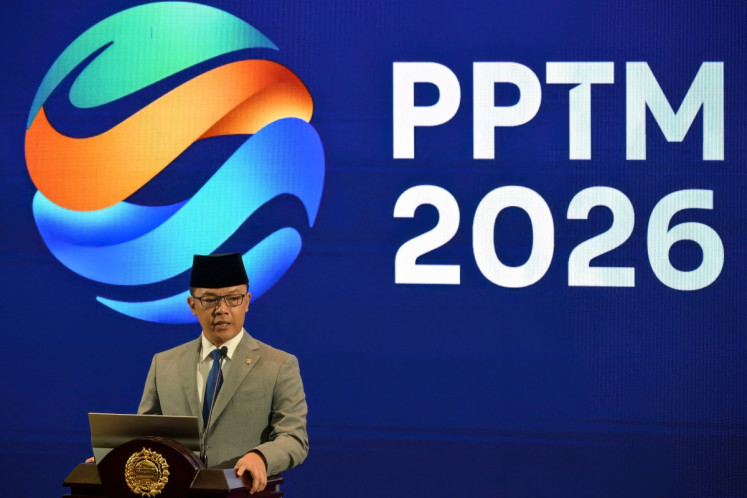Popular Reads
Top Results
Can't find what you're looking for?
View all search resultsPopular Reads
Top Results
Can't find what you're looking for?
View all search resultsGovt negligence blamed for religious intolerance
Cases of religious and ethnic intolerance across West Java are due to a lack of religious awareness, with such cases intensifying due to negligence on the part of the government, activists say
Change text size
Gift Premium Articles
to Anyone
C
ases of religious and ethnic intolerance across West Java are due to a lack of religious awareness, with such cases intensifying due to negligence on the part of the government, activists say.
The activists were speaking as part of a discussion, themed “Revealing the Image of Diversity in West Java”, which was organized by the Merah Putih Forum at the Indonesia Menggugat building in Bandung on Monday.
Among the speakers attending the event were Imparsial Institute researcher Junaidi Simun, Yasmin Indonesian Christian Church (GKI) advocacy team member Jayadi Damanik, Wahid Institute monitoring and advocacy head M. Subhi Azhari, cultural observer Acep Zamzam Noor and Bandung Institute of Technology (ITB) School of Arts rector Asep Ridwan Saidi.
West Java, the most populous province in Indonesia, is known for its deep roots of Islamic culture. Subhi said West Java was a province with the highest level of religious intolerance violations in Indonesia.
According to him, there were some factors that characterized the issue of religious freedom in West Java. The first was the criminalization of faiths, including 23 cases in 2012, 15 cases in 2011 and then 10 in 2010.
The second factor was violations relating to the construction of houses of worship and religious activities. In 2010, the number of cases stood at 22, while the number increased in 2011 to 47 cases and dropped to 30 cases in 2012.
Other issues that showed a rise in the number of cases included discriminatory actions or policies on behalf of religion. The number of cases had further increased from four in 2010 to 21 cases in 2012.
Issues related to the spread of hatred through religious activities were also taking place in West Java.
Overall, however, Subhi said various cases of violence and intolerance in the name of religion had dropped. In 2010, the number of cases stood at 57, in 2011, 128 cases were recorded and in 2012, 102 cases surfaced.
The decline, however, did not indicate that the government had been successful in dealing with religious intolerance.
“The cases have taken place due to disregard from the government. An indirect form is policy making, which restricts citizens from practicing their religious activities, as experienced by the Ahmadiyah, GKI Church congregation and the HKBP [Huria Kristen Batak Protestant] Filadelfia church,” he said.
ITB arts school rector Asep claimed that widespread cases of violence in the name of religion were attributed to superficial religious understanding.
Subhi cited the issuance of Gubernatorial Ordinance No. 12/2011 on the ban against Ahmadiyah activities as a violation of religious freedom protected by the state.
The Wahid Institute also recorded a case of marriage license annulment in November 2012, at the Salawu Religious Affairs Office in Tasikmalaya, because officials learned that the married couple were Ahmadis. A blood donation event organized by the Bandung chapter of the Indonesian Red Cross and Ahmadiyah was also cancelled.
The head of the central Bandung chapter of the Indonesia Ahmadiyah Congregation Mansur Kartadireja said members of his congregation faced difficulties in performing their religious duties due to the presence of the gubernatorial ordinance.
The congregations of some churches in the province have faced difficulties in the past year. Members of the Banua Niho Keriso Protestan (BNKP) church in Bandung, for instance, were recently unable to conduct a Sunday service due to local residents forbidding the use of a house on Jl. Cibuntu in Bandung Kidul district for any religious activities.
The GKI church in Bogor and the HKBP church in Bekasi have also faced similar situations.










